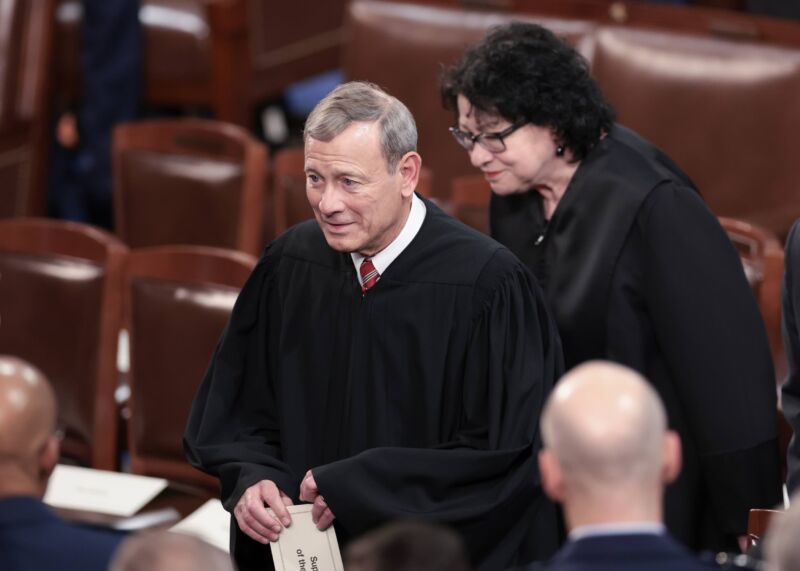
Getty Images | Win McNamee
Supreme Court justices yesterday expressed skepticism about whether federal government officials should face limits on their communications with social media networks like Facebook.
The Supreme Court previously stayed a lower-court injunction that would prevent the Biden administration from pressuring social media firms to take down content and yesterday heard oral arguments in the case brought against the US government by the Missouri and Louisiana attorneys general.
Louisiana Solicitor General J. Benjamin Aguiñaga faced skepticism from both liberal and conservative justices. Justice Amy Coney Barrett raised a hypothetical in which Louisiana state officials are doxed and targeted by threats made on social media.
“The FBI sees these posts and calls the social media outlet, like X, Facebook, whatever, and says, ‘we really encourage you to take these down because these are significantly threatening and we see some people may be responding to them.’ That’s a problem?” Barrett asked.
Aguiñaga said that “the FBI absolutely can identify certain troubling situations like that for the platforms and let the platforms take action,” but said the specifics of each hypothetical “are very important.”
Barrett replied, “but that’s just kind of falling back on, ‘well, this case is different, this case is different, and so a different legal standard should apply.’ But, you know, what we say in this case matters for other cases, too.”
“Epidemic” of broad injunctions
In this case, an injunction against US officials said they “shall take no actions, formal or informal, directly or indirectly, to coerce or significantly encourage social-media companies to remove, delete, suppress, or reduce, including through altering their algorithms, posted social-media content containing protected free speech.”
Justice Neil Gorsuch said the Supreme Court has seen “an epidemic” of what he called “universal injunctions” that affect people who aren’t directly involved in the case at hand. “Normally, our remedies are tailored to those who are actually complaining before us and not to those who aren’t,” Gorsuch said.
Aguiñaga said he wouldn’t object to the injunction being narrowed to just the specific platforms and plaintiffs involved in the case as long as the Supreme Court says “something in our favor on the merits. The government can’t just run rampant pressuring the platforms to censor private speech.”
Missouri and Louisiana alleged that the US government violated the First Amendment by colluding with social networks “to suppress disfavored speakers, viewpoints, and content.” The content included posts about vaccine side effects, pandemic lockdowns, the COVID-19 lab-leak theory, allegations of election fraud, and the Hunter Biden laptop story. There were several individual plaintiffs in addition to the Missouri and Louisiana attorneys general.
The US Court of Appeals for the 5th Circuit ruled that the White House and FBI likely violated the First Amendment by coercing social media platforms into moderating content and changing their moderation policies. The case had gone to the 5th Circuit appeals after a US District judge issued a sweeping injunction ordering the administration to halt a wide range of communications with social media companies.
The 5th Circuit narrowed that injunction, throwing out most of it but maintaining a provision that says officials may not “coerce or significantly encourage social-media companies.”
Debate about terrorist speech
The Biden administration has argued that its attempts to influence content moderation were persuasion, not coercion. Government officials were “urging platforms to remove COVID-19 misinformation, highlighting the risk of disinformation from foreign actors, and responding to the platforms’ inquiries about matters of public health,” the Biden administration has stated.
Yesterday, Justice Sonia Sotomayor criticized a brief filed by Louisiana. “I have such a problem with your brief, counselor,” Sotomayor said. “You omit information that changes the context of some of your claims. You attribute things to people who it didn’t happen to. At least in one of the defendants, it was her brother that something happened to, not her. I don’t know what to make of all this because… I’m not sure how we get to prove direct injury in any way.”
Justice Elena Kagan discussed how law enforcement officials might contact a social media company about terrorists posting on their platform. A law enforcement agency might tell the platform, “you are hosting a lot of terrorist speech, which is going to increase the chances that there’s going to be some terrible harm that’s going to take place, and we want to give you this information, we want to try to persuade you to take it down,” Kagan said.
Aguiñaga responded, “the government can absolutely do that, Justice Kagan.” He said that terrorist activity and criminal activity “is not protected speech.”
Kagan countered, “Well, that might be protected speech. I mean, terrorists engage in, you know, things that come under the First Amendment. Let’s say they’re just recruiting people for their organizations.” Kagan also said that “decades ago, it happened all the time, which is somebody from the White House got in touch with somebody from The Washington Post and said, ‘this will just harm national security,’ and The Washington Post said, ‘okay, whatever you say.'”




















+ There are no comments
Add yours